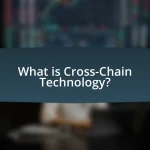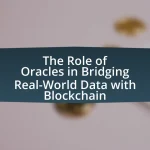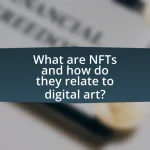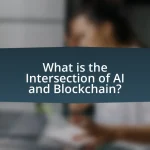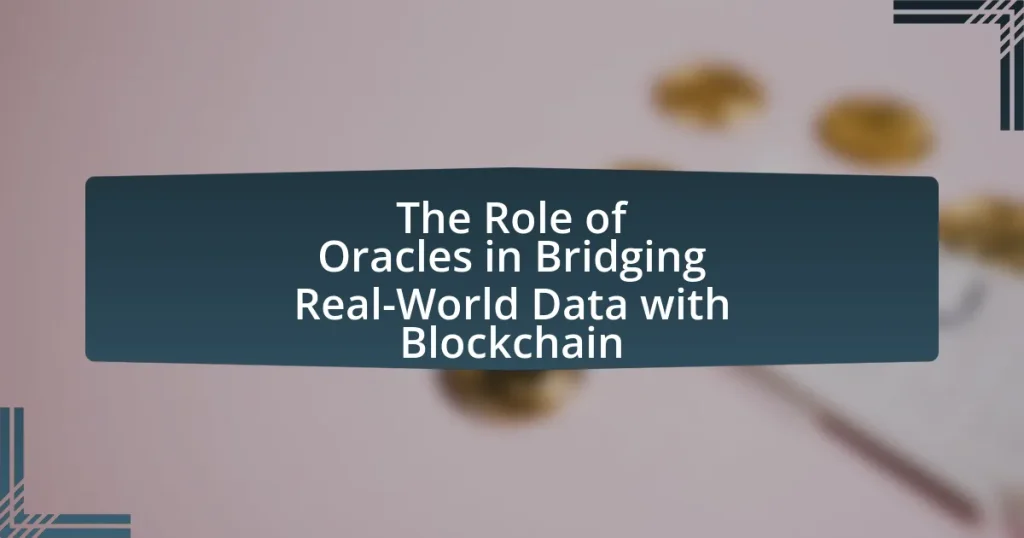Oracles are essential third-party services that connect blockchain technology with real-world data, enabling smart contracts to access external information such as market prices, weather conditions, and event outcomes. This article explores the various types of oracles, including software, hardware, and consensus oracles, and their critical role in enhancing the functionality of decentralized applications, particularly in sectors like decentralized finance (DeFi), insurance, and supply chain management. It also addresses the importance of data integrity, the challenges faced without oracles, and best practices for ensuring reliable data sources. Additionally, the article discusses future trends and potential regulatory challenges impacting oracle development in the blockchain ecosystem.

What are Oracles and Their Role in Blockchain?
Oracles are third-party services that provide external data to smart contracts on a blockchain. They play a crucial role in enabling blockchain applications to interact with real-world information, such as market prices, weather data, or event outcomes. Without oracles, smart contracts would be limited to the data available on the blockchain itself, which restricts their functionality and applicability. For instance, Chainlink is a widely used decentralized oracle network that connects smart contracts with off-chain data sources, ensuring that the information is accurate and tamper-proof. This integration of real-world data through oracles enhances the capabilities of blockchain technology, allowing for more complex and useful decentralized applications.
How do Oracles function within the blockchain ecosystem?
Oracles function within the blockchain ecosystem by acting as intermediaries that provide external data to smart contracts. They retrieve, verify, and transmit real-world information, such as market prices or weather conditions, to the blockchain, enabling smart contracts to execute based on this data. For example, decentralized finance (DeFi) applications rely on oracles to access accurate price feeds, ensuring that transactions are executed under the correct conditions. The reliability of oracles is crucial, as inaccurate data can lead to erroneous contract execution, highlighting the importance of using trusted oracle networks like Chainlink, which aggregates data from multiple sources to enhance accuracy and security.
What types of Oracles exist and how do they differ?
There are three main types of oracles: software oracles, hardware oracles, and consensus oracles. Software oracles retrieve data from online sources, such as APIs, and provide it to smart contracts, enabling them to execute based on real-time information. Hardware oracles, on the other hand, connect physical devices to the blockchain, allowing data from the real world, like IoT sensors, to be used in smart contracts. Consensus oracles aggregate data from multiple sources to ensure accuracy and reliability, reducing the risk of manipulation by relying on a majority consensus among the data providers. Each type serves a distinct purpose in facilitating the integration of real-world data into blockchain applications.
How do Oracles ensure data integrity and reliability?
Oracles ensure data integrity and reliability by utilizing multiple data sources and consensus mechanisms to verify information before it is transmitted to the blockchain. This multi-source approach minimizes the risk of inaccuracies, as it cross-references data from various trusted providers, ensuring that only consistent and verified information is relayed. Additionally, many oracles implement cryptographic techniques and decentralized networks to further enhance security and prevent tampering. For instance, Chainlink, a prominent decentralized oracle network, employs a system where multiple independent nodes fetch data and reach a consensus, thereby reinforcing the reliability of the information provided to smart contracts.
Why are Oracles essential for connecting real-world data to blockchain?
Oracles are essential for connecting real-world data to blockchain because they serve as intermediaries that facilitate the transfer of external information into smart contracts. Without oracles, blockchains would be isolated from real-world events and data, limiting their functionality and applicability. For instance, in decentralized finance (DeFi), oracles provide critical price feeds for assets, enabling automated trading and lending based on real-time market conditions. The reliance on oracles is evidenced by the widespread use of services like Chainlink, which aggregates data from multiple sources to ensure accuracy and reliability, thereby enhancing the integrity of blockchain applications.
What challenges do blockchains face without Oracles?
Blockchains face significant challenges without Oracles, primarily the inability to access real-world data. This limitation restricts smart contracts from executing based on external conditions, leading to a lack of functionality in applications that require real-time information, such as financial markets or supply chain management. Additionally, without Oracles, blockchains cannot verify the authenticity of off-chain data, increasing the risk of fraud and manipulation. This lack of reliable data sources undermines trust in decentralized applications, as they cannot interact with the outside world effectively. Consequently, the overall utility and adoption of blockchain technology are hindered, as many use cases depend on accurate and timely data inputs.
How do Oracles enhance the functionality of smart contracts?
Oracles enhance the functionality of smart contracts by providing them with access to real-world data that is not natively available on the blockchain. This capability allows smart contracts to execute based on external conditions, such as market prices, weather data, or event outcomes. For instance, a smart contract for a decentralized insurance policy can utilize an oracle to verify weather conditions before triggering a payout. The integration of oracles thus expands the applicability of smart contracts beyond the blockchain, enabling them to interact with real-world events and data sources, which is essential for their effectiveness in various use cases.

What are the Different Types of Oracles?
There are three main types of oracles: software oracles, hardware oracles, and consensus oracles. Software oracles retrieve data from online sources, such as APIs or websites, and deliver it to smart contracts on the blockchain. Hardware oracles, on the other hand, connect physical devices to the blockchain, allowing real-world data from sensors or IoT devices to be utilized. Consensus oracles aggregate data from multiple sources to ensure accuracy and reliability, often using a voting mechanism to determine the most trustworthy information. These classifications highlight the diverse methods through which oracles facilitate the integration of real-world data into blockchain systems.
How do centralized and decentralized Oracles compare?
Centralized oracles rely on a single source of data, while decentralized oracles aggregate information from multiple sources to enhance reliability and security. Centralized oracles can be faster and simpler to implement, but they pose a higher risk of data manipulation or failure due to their single point of failure. In contrast, decentralized oracles mitigate risks by distributing data collection across various nodes, making them more resilient against attacks and inaccuracies. This distinction is crucial as it affects the trustworthiness of the data being fed into blockchain systems, with decentralized oracles generally providing a more robust solution for critical applications.
What are the advantages and disadvantages of centralized Oracles?
Centralized Oracles provide advantages such as ease of implementation and faster data retrieval, as they rely on a single source for information, which simplifies the process. This centralized approach can lead to lower operational costs and quicker decision-making, as seen in applications like price feeds for decentralized finance (DeFi) platforms. However, the disadvantages include a single point of failure, which poses security risks and potential manipulation of data, undermining trust in the system. Additionally, reliance on one entity can lead to issues of transparency and accountability, as the centralized nature may not allow for independent verification of the data provided.
How do decentralized Oracles improve security and trust?
Decentralized oracles enhance security and trust by eliminating single points of failure and reducing the risk of data manipulation. Unlike centralized oracles, which rely on a single source for data, decentralized oracles aggregate information from multiple independent sources, ensuring that no single entity can control or alter the data. This distributed approach mitigates the risk of fraud and enhances the reliability of the information provided to smart contracts. Furthermore, the consensus mechanism employed by decentralized oracles ensures that only data that has been verified by multiple sources is accepted, thereby increasing the overall integrity of the data used in blockchain applications.
What role do hardware and software Oracles play?
Hardware and software oracles serve as critical intermediaries that connect blockchain networks with real-world data. Hardware oracles utilize physical devices to gather and transmit data from the external environment, ensuring that the information is accurate and tamper-proof. For example, a temperature sensor can provide real-time data to a smart contract that requires environmental conditions to execute. Software oracles, on the other hand, fetch data from online sources, such as APIs or web services, and relay it to the blockchain. An instance of this is a software oracle that retrieves cryptocurrency prices from various exchanges to facilitate trading on a decentralized platform. Both types of oracles are essential for enabling smart contracts to interact with real-world events and conditions, thereby expanding the functionality and applicability of blockchain technology.
How do hardware Oracles gather data from the physical world?
Hardware oracles gather data from the physical world by utilizing sensors and devices that capture real-time information. These oracles connect to various data sources, such as environmental sensors, GPS devices, and IoT devices, to collect data like temperature, location, and other measurable parameters. The gathered data is then transmitted to a blockchain network, ensuring that the information is securely recorded and can be accessed by smart contracts. This process is validated by the fact that hardware oracles are designed to provide reliable and tamper-proof data, which is essential for the accurate execution of blockchain applications that rely on real-world information.
What are the limitations of software Oracles in data retrieval?
Software Oracles have limitations in data retrieval primarily due to their reliance on external data sources, which can introduce inaccuracies and inconsistencies. These oracles depend on APIs and web services that may not always provide reliable or up-to-date information, leading to potential discrepancies in the data retrieved. Additionally, software Oracles can be vulnerable to manipulation or attacks, as they often interact with unverified data sources, which can compromise the integrity of the information they provide. Furthermore, the lack of standardization across different Oracles can result in interoperability issues, making it challenging to ensure consistent data retrieval across various blockchain platforms.

What are the Use Cases of Oracles in Blockchain?
Oracles in blockchain serve as intermediaries that provide external data to smart contracts, enabling them to execute based on real-world information. Use cases include decentralized finance (DeFi), where oracles supply price feeds for assets, ensuring accurate transactions; insurance, where they verify real-world events like natural disasters to trigger payouts; and supply chain management, where they track goods and verify conditions such as temperature or humidity. These applications demonstrate how oracles enhance the functionality of blockchain by integrating off-chain data, thereby facilitating automated and trustless processes.
How are Oracles used in decentralized finance (DeFi)?
Oracles are used in decentralized finance (DeFi) to provide smart contracts with real-world data, enabling them to execute transactions based on external information. For instance, price oracles supply accurate market prices for assets, allowing DeFi applications like lending platforms and decentralized exchanges to function effectively. The reliability of oracles is crucial, as they aggregate data from multiple sources to minimize the risk of manipulation and ensure that smart contracts operate on accurate and timely information. This integration of real-world data into blockchain systems is essential for the functionality and trustworthiness of DeFi applications.
What specific applications of Oracles enhance DeFi protocols?
Oracles enhance DeFi protocols by providing real-time data feeds, enabling smart contracts to execute based on external information. Specific applications include price feeds that allow decentralized exchanges to determine asset values accurately, ensuring fair trading conditions. Additionally, oracles facilitate lending and borrowing protocols by supplying interest rates and collateral valuations, which are essential for risk assessment. Furthermore, they support insurance products by delivering data on real-world events, such as weather conditions or flight statuses, which trigger policy payouts. These applications are critical for the functionality and reliability of DeFi systems, as they bridge the gap between blockchain technology and real-world data.
How do Oracles facilitate price feeds in DeFi platforms?
Oracles facilitate price feeds in DeFi platforms by acting as intermediaries that provide real-time data from external sources to smart contracts on the blockchain. They aggregate price information from various exchanges and data providers, ensuring that DeFi applications have access to accurate and up-to-date market prices. For instance, Chainlink, a prominent oracle network, sources data from multiple decentralized oracles to minimize the risk of manipulation and ensure reliability. This mechanism allows DeFi platforms to execute trades, loans, and other financial operations based on real-world asset prices, thereby enhancing the functionality and trustworthiness of decentralized finance.
What industries benefit from the integration of Oracles?
The industries that benefit from the integration of Oracles include finance, supply chain, insurance, healthcare, and gaming. In finance, Oracles provide real-time market data for decentralized finance (DeFi) applications, enabling accurate pricing and trading. In supply chain management, Oracles facilitate the tracking of goods and verification of conditions, enhancing transparency and efficiency. The insurance industry utilizes Oracles to automate claims processing through real-world event data, reducing fraud and improving customer experience. In healthcare, Oracles can connect patient data with blockchain systems for secure and compliant data sharing. Lastly, the gaming industry leverages Oracles to create provably fair gaming experiences by integrating external data into smart contracts.
How do Oracles impact supply chain management?
Oracles significantly enhance supply chain management by providing real-time data from external sources to blockchain networks. This integration allows for improved transparency, accuracy, and efficiency in tracking goods and verifying transactions. For instance, oracles can supply information such as weather conditions, shipment statuses, and market prices, which are crucial for decision-making processes. According to a report by Gartner, organizations that utilize blockchain with oracles can reduce supply chain costs by up to 30% due to better data accuracy and reduced fraud. Thus, the role of oracles is pivotal in ensuring that supply chain operations are responsive and data-driven.
What role do Oracles play in insurance and risk assessment?
Oracles serve as crucial intermediaries that connect real-world data with blockchain systems in insurance and risk assessment. They facilitate the accurate and timely delivery of external information, such as weather conditions, market prices, or health data, which is essential for evaluating risks and processing claims. For instance, in parametric insurance, oracles can automatically trigger payouts based on predefined conditions, such as rainfall levels exceeding a certain threshold, thereby streamlining the claims process and reducing fraud. This integration of real-time data enhances the reliability of risk assessments and ensures that insurance products are more responsive to actual events, ultimately leading to more efficient and transparent insurance operations.
What are the future trends for Oracles in blockchain technology?
Future trends for Oracles in blockchain technology include increased decentralization, enhanced security measures, and the integration of AI for data validation. Decentralization will reduce reliance on single data sources, mitigating risks of manipulation and improving trustworthiness. Enhanced security measures, such as cryptographic proofs, will protect data integrity and ensure that the information provided to smart contracts is accurate. The integration of AI will facilitate real-time data analysis and validation, allowing Oracles to process and verify large volumes of data efficiently. These trends are supported by the growing demand for reliable data in decentralized finance (DeFi) and other blockchain applications, as evidenced by the rise of projects like Chainlink, which has established itself as a leader in providing decentralized Oracle solutions.
How might advancements in technology affect Oracle development?
Advancements in technology will significantly enhance Oracle development by improving data accuracy, speed, and integration capabilities. For instance, the rise of artificial intelligence and machine learning can enable Oracles to process and analyze vast amounts of real-world data more efficiently, ensuring that the information fed into blockchain systems is both timely and precise. Additionally, the development of advanced APIs and interoperability standards can facilitate seamless connections between various data sources and blockchain networks, thereby expanding the utility and functionality of Oracles in diverse applications.
What potential regulatory challenges could impact Oracles?
Potential regulatory challenges that could impact Oracles include compliance with data privacy laws, such as the General Data Protection Regulation (GDPR) in Europe, which mandates strict guidelines on data handling and user consent. Oracles, which facilitate the transfer of real-world data to blockchain networks, may face scrutiny regarding how they collect, store, and transmit personal data. Additionally, regulatory bodies may impose restrictions on the types of data that can be used, particularly in sectors like finance and healthcare, where sensitive information is prevalent. The evolving nature of blockchain technology may also lead to regulatory uncertainty, as existing frameworks may not adequately address the unique characteristics of Oracles, potentially resulting in inconsistent enforcement across jurisdictions.
What best practices should be followed when using Oracles?
When using Oracles, it is essential to ensure data accuracy and reliability by selecting reputable data sources. This practice minimizes the risk of incorrect information being fed into the blockchain, which can lead to erroneous smart contract execution. Additionally, implementing multiple Oracles for cross-verification enhances data integrity, as it allows for consensus among different data providers. Security measures, such as encryption and secure communication protocols, should also be employed to protect data transmission from tampering. Furthermore, regular audits of Oracle performance and data quality can help maintain trustworthiness over time. These best practices collectively contribute to the effective functioning of Oracles in bridging real-world data with blockchain technology.
How can users ensure the reliability of Oracle data sources?
Users can ensure the reliability of Oracle data sources by implementing rigorous validation processes and utilizing multiple data feeds. Validation processes involve cross-referencing data from different sources to confirm accuracy, while multiple data feeds reduce the risk of relying on a single point of failure. For instance, using decentralized oracles that aggregate data from various providers can enhance reliability, as demonstrated by projects like Chainlink, which employs a network of independent nodes to verify data integrity before it is sent to the blockchain. This approach not only increases trust in the data but also mitigates the impact of any potential inaccuracies from individual sources.
What strategies can be employed to mitigate Oracle-related risks?
To mitigate Oracle-related risks, organizations can implement strategies such as using multiple oracles, ensuring data validation, and employing decentralized oracle networks. Utilizing multiple oracles reduces reliance on a single data source, thereby minimizing the risk of inaccurate or manipulated data. Data validation techniques, such as cross-referencing information from different sources, enhance the reliability of the data being fed into the blockchain. Decentralized oracle networks distribute the data sourcing process across various nodes, which further decreases the likelihood of a single point of failure or manipulation. These strategies collectively strengthen the integrity and security of the data that oracles provide to blockchain systems.
